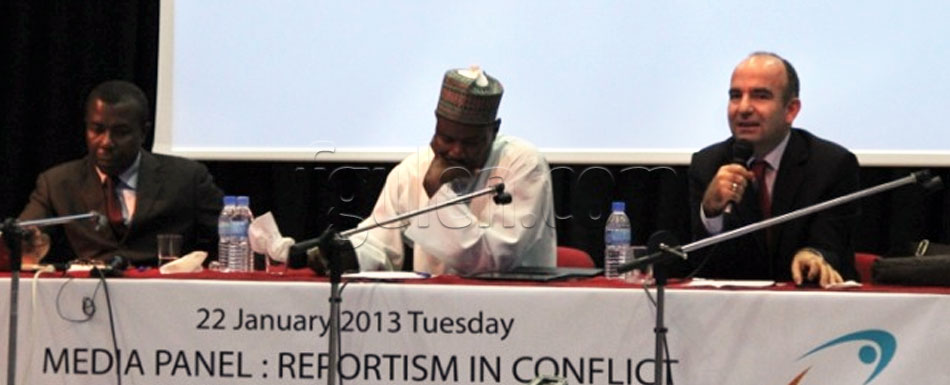Media release reportism in conflict

"We suggest that the Gülen principles of dialogue, tolerance, coexistence and mutual understanding should be applied in the training of media reporters as well as in the strategic procedures of reporting conflict issues. This will promote the values of humanitarianism and culture of peaceful coexistence needed in every political system to nip conflict in its bud and increase the virtues of peace."
The Media Panel: Reportism in Conflict organized by Ufuk Dialogue Foundation and Nigerian Turkish Nile University held on Tuesday, January 22, 2013 at Nigerian Turkish Nile Univeristy; Abuja. There were 250 participants following the panel: Turkish Ambassador to Abuja Mr. Rıfat Koksal, The VC of NTNU and Nasarawa Univeristy, President of Ufuk DF, Media representatives, academicians, NGO representatives and students.
The guest speaker of the panel was Mr. Abdülhamit Bilici, the General Manager of Cihan News Agency (Zaman Media Group). In his speech he said: "As you know, the models of the media can be listed as follows: the authoritarian model, the libertarian model, the Soviet-Communist model and, finally, the social responsibility model. In my opinion, the solution to most problems lies in the social responsibility model. The emergence of the social responsibility model is essentially an account of the evolution of the media itself. Media organizations could not enjoy freedom in their activities when they were state-controlled. However, as state supervision was lifted, the media started to determine a set of rules based on market conditions. But due to wild market conditions, media organizations started to make economic concessions. Ultimately, media theoreticians developed the social responsibility model, which forbids both state influence and market influence. What does this model advocate? Let there be no external censorship. Let there be no state influence or manipulation of advertisers. Let editors act with social responsibility. This is the responsibility of publishers.
The Zaman Media Group has for 25 years been an important and successful example of responsible media. One could list its core principles as telling the truth, in every article giving the accused a chance to explain their side, active support for peace and dialogue initiatives, no denigration, no defamation, no sensationalism, supporting positive principles and not certain political parties, and encouraging good news while also not ignoring bad news.
Everyone has shining principles, everyone says they are for peace and love. The important point is not words but deeds. How then do we turn those principles into action despite pressure from the conventional media's established habits. The Zaman Media Group's editorial line can be defined as progressive conservative. It is a synthesis of Turkish, Islamic, traditional values and universal principles like democracy and the rule of law. We support polyphony by giving a platform to columnists from very different ideological, ethnic and religious backgrounds. Their common denominator is democracy."
On Terorism, Bilici said: "We have a clear position on terrorism and violence. Irrespective of the motive, we condemn any terrorist act. We do not hide our Islamic identity, but we do place a distance between Islam and terrorism. Prominent figures such as Fethullah Gülen condemned such terrorist acts in the name of Islam and we have publish this several times as a headline story despite death threats. And The Zaman Media Group strongly supports initiatives for dialogue among different cultures, religions and civilizations. We invite representatives of such groups to our conferences and editorial meetings. By these values Zaman, become the highest-circulated daily in Turkey. In Turkey's most violent region (South-Eastern Turkey where there are terrorist activities), the circulation of Zaman is twice as high as that of all the other dailies combined."
In Abuja Panel the second speaker was Dr. Enwere Who is the Head of Political Science Department-NTNU.
He said, "Because of the struggle for power and the competitive nature of international politics, the media in this contemporary era of globalization is used by the Great powers as instruments of psychological coercion and propaganda to twist news and information necessary for promoting values of hegemonic unipolarism in world politics as well as to control the minds and actions of middle and small powers... The media to play objective roles in conflict resolution there is need for the restructuring of its patterns of reporting conflict situations in order to make the media more proactive in promoting peace and harmonious relationships in the political system. To achieve this new posture in media reporting of conflict situation, we suggest that the Gülen principles of dialogue, tolerance, coexistence and mutual understanding should be applied in the training of media reporters as well as in the strategic procedures of reporting conflict issues. This will promote the values of humanitarianism and culture of peaceful coexistence needed in every political system to nip conflict in its bud and increase the virtues of peace.
- Created on .
